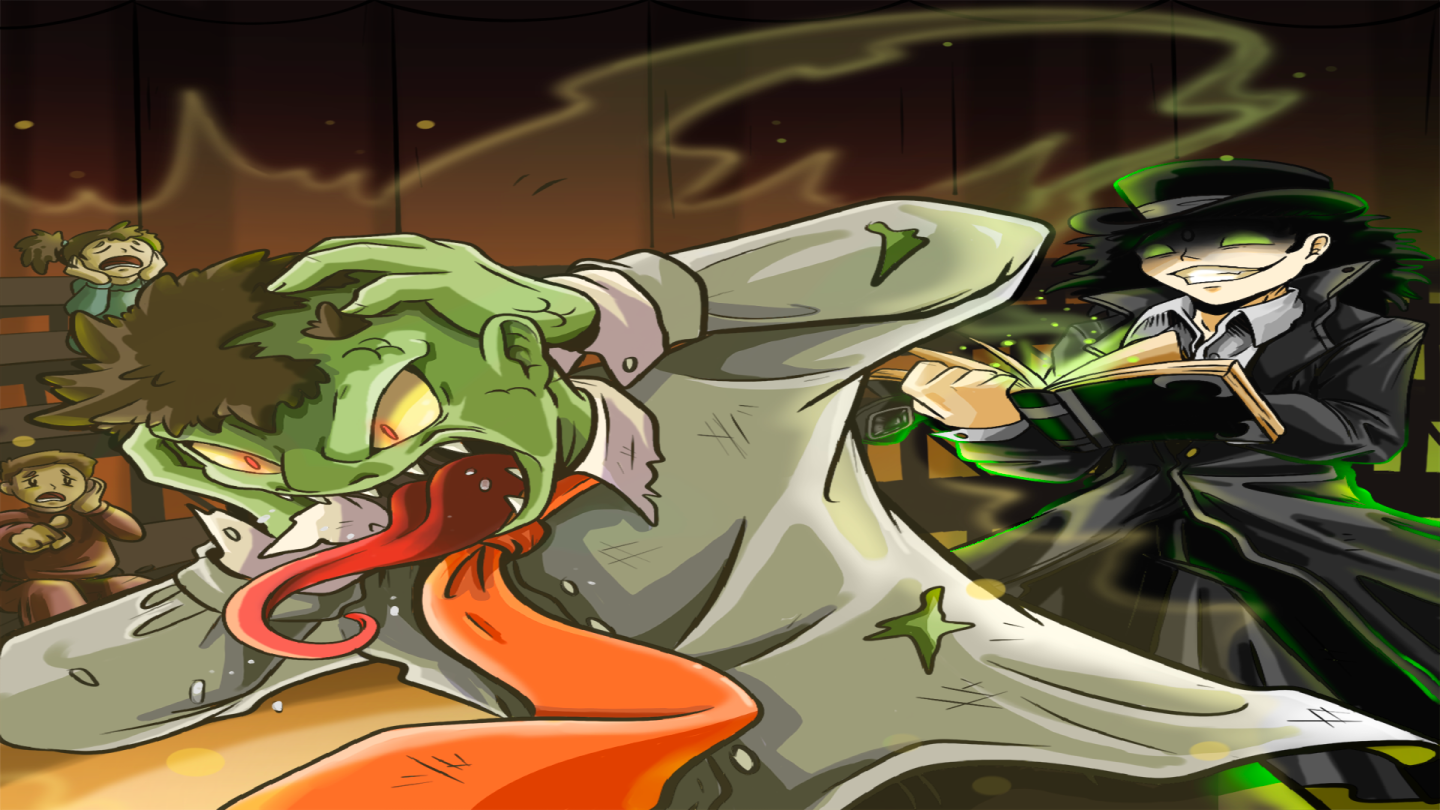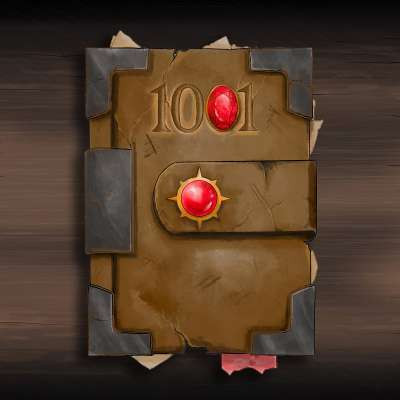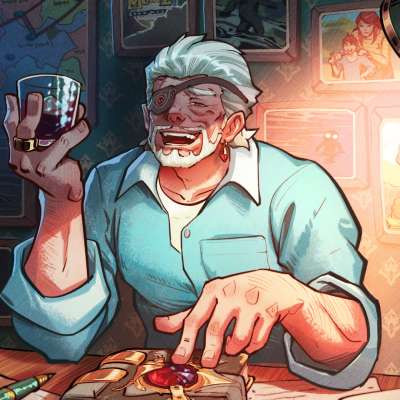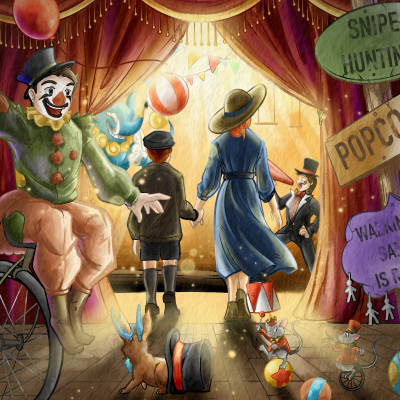I: Blake. The Performance. In the Crowd.
Blake had clearly assumed I was coming to join him—one side of his tent had been cleared to make space for a second bunk. His assistant, the albino, met me at the Bòcan Pavilions’ entrance and escorted me to my new home. Without a contract, without a request, without a single word, I became part of the traveling carnival.
For the first three days after I arrived, Blake was not to be seen. The albino—whose name was Whitnail—told me that Blake was “bred for the metropolitan lifestyle,” which I interpreted generously to suggest that he was preoccupied with the illicit luxuries Edinburgh had to offer. At the age of fifteen, I was fairly certain I knew all there was to know about such matters.
I did note, however, that his spellbook was not in the tent.
Whitnail was my constant companion for those days; he would continue to be so even after Blake returned and the Pavilions packed up and moved north from Edinburgh later in the week. He escorted me from Blake’s tent to the meal tent and to the latrines that the carnival hands dumped daily in the Water of Leith, which would have us run out of town if the locals knew, Whitnail cautioned me.
“They should believe the filth in the river is all their own,” he said so calmly that I wasn’t sure if he was trying to make a joke.
I avoided the curious glances of the others who made the Pavilions their home and life. And at the same time, I tried not to stare. Not at the tiny people who were full-grown yet smaller than children. Not at the dog boy or the twins born without eye sockets. Not at the Magnetic Man, whose actual name was Hugh, who was covered in so many piercings that you could hardly see his skin anymore. In time, I would feel perfectly comfortable around them, but in those early days, my hands shook much of the time. I blinked tears and slept only after weeping.
To any who approached us, Whitnail introduced me as Blake’s protégé.
“They do not care about your name yet,” he told me. “They do not know if you will last.”
When my lip trembled, he added, “But I know your name is Abrams, son of Angel.”
I moaned. How I missed my mother. Hearing her name and the name only she called me reminded me how far away she was now, in another life. Maybe forever.
On the fourth morning, Blake appeared as if from nothingness. His bunk looked slept in, but that was its constant state, so as I woke to his humming, he seemed to have simply stepped out of the rising sun to begin the day. He was dressed in the same black clothing I’d seen him in earlier that week when I’d come with Mam, yet he looked fresh, as if both he and his attire were freshly laundered and pressed.
“Good morning, Arthur,” he said. “We leave Edinburgh tomorrow. So, tonight, I’ll show you your first magic, my young protégé.”
I said, “I don’t like it when you call me that.”
“Protégé?”
“Arthur.”
Blake smiled. “And would you object to calling me Merlin?”
“Look, I came, didn’t I? If you hadn’t told me your name was Blake, I’d have happily called you Upton Nogood. It doesn’t matter to me.” I caught myself. “I don’t want to be here, but I do. Don’t you want me here?”
“I need to refer back to your own sentiment then: I do, but I don’t. You and I are pilgrims in an unexplored desert, and we must count on each other to navigate it. But with care and caution, you could become a great caster. Perhaps the greatest.”
He waited for me to speak, but I didn’t for a long while. It sounded rehearsed to me, scripted, what he said about our union. I trust my mother’s wisdom, however, and whatever her relationship with Blake had been, she believed he could teach me about cryptids and what it meant that I could see them. My list of questions was already long—the midwife cryptid from my birth, the terrifying monstrosity on the card he had shown me, casters and mapping and essence and spellbooks. What I was. But I had to trust in my mam, and I had to remember my da’s last words to me: you are the least of us.
“I’ll be careful then,” I finally said.
“And I will as well.” He extended his hand. “Abraham.”
I shook his hand. “Merlin.”
***
That night, our last with an Edinburgh audience, I stood off to the side of a movable stage, close to the canvas wall that encircled the Pavilions’ grand tent, the “big top,” as it was called in America. When he came to escort me, Whitnail called it a chapiteau, and when I asked him if he were French, he just shook his head.
The tent’s interior was exceptionally warm—easily two hundred people, maybe more, filled the stools and the standing room at the back, and the poles around the perimeter suspended oil lamps that cast shadows longer than Whitnail. The body heat, the flames, and the nervous anticipation all contributed to a muggy summer night.
The stage was lined on three sides by thick red velvet curtains; across the front, holding them closed where they opened, was a sizable cloth banner emblazoned with stylized letters:
BLAKE THE BLACK
“Well, that explains a few things,” I said, looking up at Whitnail’s relaxed face. “‘Blake with the Black Wardrobe.’ I guess you’re Whitnail the White?”
The albino looked down at me, frowning. “The Pale. Why white?”
The banner suddenly flew up into the dark shadows of the tent’s ceiling, and the curtains parted to reveal Blake alone on the stage. The audience clapped enthusiastically—Blake’s reputation in Edinburgh had clearly preceded this final performance before the Bòcan Pavilions moved on.
A trio of lanterns was suspended above him, their light focused in beams that intersected where Blake stood, all in black—the gloves, a black fedora with a dark gray band around it, a black tuxedo with a black vest, shirt, and tie beneath it. His hair had been treated in some manner to make it expand around his head like a mane, and he had acquired a black circle in the center of his forehead that had deceptively discernible depth—it looked like a dark hole in his skull. He held the leatherbound book that I recognized from my first meeting with him: his spellbook. He slowly opened it and then looked out over his audience. When he grinned, his teeth were whiter than pearls. Some in the audience gasped; at least one child cried out. Blake the Black was a terrible sight to behold.
And that was even before he called forth his nightmare.
He slowly and meticulously stripped off one of his gloves, dropping it to the stage floor. The silence in the tent was so deep that it almost hummed with the absence of any sound at all. With his gloved hand, he opened his spellbook and lifted it as high as his chest. Then he raised his bare hand, fingers spread, palm toward the audience, and lowered it slowly until it touched the page tilted toward him.
A cryptid walked from the wings to join him on stage.
It was a man, middle-aged, in a pin-striped suit, tie, nondescript. A face you wouldn’t remember, an anonymous figure in a crowd who would return to his equally forgettable wife and ordinary children in a commonplace suburban flat. Blake jerked his chin toward the front center of the stage, and the man obliged, stopping within a few feet of the front row of the audience. A murmur and a muttering drifted across the tent. Someone at the back laughed and catcalled something about the terror of chartered accountants. All this while, Blake’s unnatural grin remained. I saw his lips move.
The plain accountant suddenly changed, shifted. The unassuming, unexceptional face vanished. The skin cracked and pulsed—expanding, changing colors, and becoming scale-like–to a sound like the shuffling of cards. The suit tore and shredded. Its hands became green claws, its face elongated to a snout with fangs, its eyes yellowing to a reptilian glow. It grew before our eyes, rapidly towering over Blake with a tongue that flicked out to taste the air. Its necktie tightened around its throat until I thought it would tear, but it held. A massive tail thunked onto the stage as if dropped from a great height.
It roared at the audience. And the screaming began.
I involuntarily withdrew a step before I realized that Whitnail was gone. When I looked back, he was ascending the steps to the stage like a white wraith, almost floating to stand beside the lizard man. For a moment, the audience reacted with comparable terror to him, but when Whitnail raised his hands in a calming gesture, the audience paused as one, and the lizard man cowered as if the albino were its master. Blake was like a mannequin, frozen in time behind the other two creatures on the stage.
“Blake the Black protects us from the demon,” Whitnail announced, his voice as serene as ever, if louder. The audience was entranced; they had clearly never seen the likes of him. “He is the master of many worlds. Observe his control.”
The albino stepped into the wings of the stage whence came the cryptid, and Blake began to speak.
“Bow,” he commanded the lizard man. “Collect your torn attire.”
The lizard man tipped its head to the audience—the front row fell backward into those behind them as if they were about to be attacked. When the cryptid began to gather the shredded pieces of the suit it had been wearing, someone among those front row audience members laughed. The lizard man’s head snapped around, and it snarled. The laughter choked into silence.
“Center stage,” Blake ordered. Like a lion in a macabre circus, the lizard man obeyed, moving back from the stage’s edge.
Blake shouted at the top of his voice, “On your head, beast. Blake the Black commands it.”
The lizard man’s tongue flickered furiously—I suspected in rage—but it lowered itself forward until the flat of its head was on the stage, and then it thrust its lower extremities skyward by the tail, balancing itself upside down. Its necktie flopped across its snout. The silliness of it all was meant to disarm the paying customers before us who were convinced a demon was about to shred their souls.
The audience was fooled; they applauded.
As I scanned their faces, taken aback by the ease with which Blake had first fooled them with the appearance of the essence of a cryptid he had mapped and then a second time with his supposed control of it, I saw someone in the crowd who stood apart. While everyone else clapped and shouted with surprise and relief, one middle-aged woman stood with her arms crossed. She wore thick-rimmed specs and a purplish felt beret that seemed more appropriate for a younger woman. Her demeanor was what caught my attention—she looked scornful, as if she knew exactly what she was seeing and was judging it harshly. When the audience settled and found their center again, she knelt, picked up a small leather bag, and excused herself from the tent. I watched her go; she was followed by three others, all men, none of whom so much as glanced back when Blake the Black ordered the lizard man to vanish—and it did.
I would see her two more times in the years to come: the next time would be when I talked to her, and the last time would be when she died.




